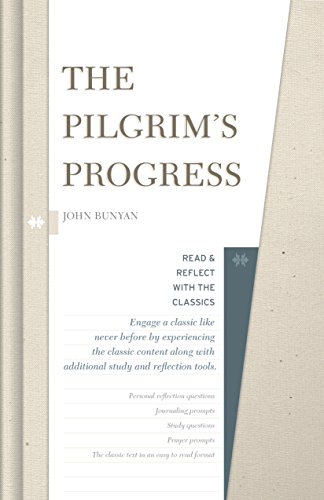-
Grace Abounding to the Chief of Sinners
John Bunyan
eBook (Digireads.com, April 3, 2004)John Bunyan (1628-1688) is most famously known for writing "The Pilgrim's Progress", a two-part allegory of the Christian pilgrimage toward salvation. The wildly popular book was written in Bedford during Bunyan's time in prison—he was sentenced to twelve years for holding unlicensed church services. During this time Bunyan also completed an autobiography recounting the story of his own conversion from a life of sin and impiety to one of virtue and spiritual regeneration. "Grace Abounding to the Chief of Sinners" illustrates the tenets of Puritanism through what Bunyan saw as God's saving grace in his own life. He reflects on a sinful youth, and how it led him towards an impious adulthood. Those who read the novel are comforted by Bunyan's honest admission to feelings of despair and doubt; even today, many people can identify with his struggles, and find inspiration in his faith and religious conviction.
-
Grace Abounding to the Chief of Sinners
John Bunyan
eBook (Digireads.com, April 3, 2004)John Bunyan (1628-1688) is most famously known for writing "The Pilgrim's Progress", a two-part allegory of the Christian pilgrimage toward salvation. The wildly popular book was written in Bedford during Bunyan's time in prison—he was sentenced to twelve years for holding unlicensed church services. During this time Bunyan also completed an autobiography recounting the story of his own conversion from a life of sin and impiety to one of virtue and spiritual regeneration. "Grace Abounding to the Chief of Sinners" illustrates the tenets of Puritanism through what Bunyan saw as God's saving grace in his own life. He reflects on a sinful youth, and how it led him towards an impious adulthood. Those who read the novel are comforted by Bunyan's honest admission to feelings of despair and doubt; even today, many people can identify with his struggles, and find inspiration in his faith and religious conviction.
-
Grace Abounding to the Chief of Sinners
John Bunyan
eBook (Digireads.com, April 3, 2004)John Bunyan (1628-1688) is most famously known for writing "The Pilgrim's Progress", a two-part allegory of the Christian pilgrimage toward salvation. The wildly popular book was written in Bedford during Bunyan's time in prison—he was sentenced to twelve years for holding unlicensed church services. During this time Bunyan also completed an autobiography recounting the story of his own conversion from a life of sin and impiety to one of virtue and spiritual regeneration. "Grace Abounding to the Chief of Sinners" illustrates the tenets of Puritanism through what Bunyan saw as God's saving grace in his own life. He reflects on a sinful youth, and how it led him towards an impious adulthood. Those who read the novel are comforted by Bunyan's honest admission to feelings of despair and doubt; even today, many people can identify with his struggles, and find inspiration in his faith and religious conviction.
-
Grace Abounding to the Chief of Sinners
John Bunyan
eBook (Digireads.com, April 3, 2004)John Bunyan (1628-1688) is most famously known for writing "The Pilgrim's Progress", a two-part allegory of the Christian pilgrimage toward salvation. The wildly popular book was written in Bedford during Bunyan's time in prison—he was sentenced to twelve years for holding unlicensed church services. During this time Bunyan also completed an autobiography recounting the story of his own conversion from a life of sin and impiety to one of virtue and spiritual regeneration. "Grace Abounding to the Chief of Sinners" illustrates the tenets of Puritanism through what Bunyan saw as God's saving grace in his own life. He reflects on a sinful youth, and how it led him towards an impious adulthood. Those who read the novel are comforted by Bunyan's honest admission to feelings of despair and doubt; even today, many people can identify with his struggles, and find inspiration in his faith and religious conviction.
-
The Pilgrim's Progress
John Bunyan
Hardcover (B&H Books, March 1, 2017)The Pilgrim’s Progress was written by John Bunyan in 1678 and is an allegory on the Christian life. It is regarded by many as one of the most significant religious works ever written. This publication gives an added layer by providing thought provoking questions at the end of each chapter, to encourage the reader to dig deeper into the biblical truths present in this classic piece of literature.
-
The Pilgrim's Progress
John Bunyan
Paperback (CreateSpace Independent Publishing Platform, Oct. 27, 2018)The Pilgrim's Progress from This World to That Which Is to Come by John Bunyan is a bright example of the new Christian allegory of XVII century. The author, son of an ordinary sheet metal worker (rather despised job that had to done by the people with the lowest social status in England), John Bunyan used to be a sinner and ribald before marriage. Only after marrying an orphan Marry, whose only heritage was two books: Plain Man’s Pathway to Heaven by Arthur Dent and Practice of Piety by Lewis Bayly, he started his uneasy way to moral recovery. Considerably soon, Bunyan became a preacher. He was numerously chased by the authorities as well as English Church for his Christian views, baptistic in particular. He began writing The Pilgrim's Progress from This World to That Which Is to Come in prison. The book is questionable and contradictive but written very sincerely and persuasively. This work is probably one of the most famous allegories ever written. The book is translated into many languages. Protestants translated often the book into different languages as the second one after the Bible.
-
The Pilgrim's Progress: By John Bunyan : Illustrated
John Bunyan
eBook (Digireads.com, March 30, 2004)About The Pilgrim's Progress by John BunyanHow is this book unique?E-reader & tablet formatted, Font Adjustments100% Original contentUnabridged EditionAuthor Biography InsideIllustrations includedThe Pilgrim's Progress from This World to That Which Is to Come; Delivered under the Similitude of a Dream is a Christian allegory written by John Bunyan (1628–1688) and published in February, 1678. It is regarded as one of the most significant works of religious English literature, has been translated into more than 200 languages, and has never been out of print. Bunyan began his work while in the Bedfordshire county prison for violations of the Conventicle Act, which prohibited the holding of religious services outside the auspices of the established Church of England. Early Bunyan scholars like John Brown believed The Pilgrim's Progress was begun in Bunyan's second, shorter imprisonment for six months in 1675, but more recent scholars like Roger Sharrock believe that it was begun during Bunyan's initial, more lengthy imprisonment from 1660–72 right after he had written his spiritual autobiography, Grace Abounding to the Chief of Sinners.
-
Pilgrim's Progress
John Bunyan
eBook (Digireads.com, March 30, 2004)Begun while John Bunyan was in Bedfordshire county jail serving time for holding religious services outside the auspices of the Church of England, Pilgrim's Progress is considered one of the greatest works of the English language. "Pilgrim's Progress" is a Christian allegory that concerns the path of one's soul to Heaven. John Bunyan published the first part of the "Pilgrim's Progress" in 1678 with a second part to follow in 1679. Contained here in this volume is both the first and second part of "Pilgrim's Progress."
-
The Pilgrim's Progress: By John Bunyan : Illustrated
John Bunyan
eBook (Digireads.com, Oct. 29, 2017)About The Pilgrim's Progress by John BunyanHow is this book unique?E-reader & tablet formatted, Font Adjustments100% Original contentUnabridged EditionAuthor Biography InsideIllustrations includedThe Pilgrim's Progress from This World to That Which Is to Come; Delivered under the Similitude of a Dream is a Christian allegory written by John Bunyan (1628–1688) and published in February, 1678. It is regarded as one of the most significant works of religious English literature, has been translated into more than 200 languages, and has never been out of print. Bunyan began his work while in the Bedfordshire county prison for violations of the Conventicle Act, which prohibited the holding of religious services outside the auspices of the established Church of England. Early Bunyan scholars like John Brown believed The Pilgrim's Progress was begun in Bunyan's second, shorter imprisonment for six months in 1675, but more recent scholars like Roger Sharrock believe that it was begun during Bunyan's initial, more lengthy imprisonment from 1660–72 right after he had written his spiritual autobiography, Grace Abounding to the Chief of Sinners.
-
The Pilgrim's Progress : By John Bunyan - Illustrated
John Bunyan
eBook (Digireads.com, Dec. 17, 2016)How is this book unique?Unabridged (100% Original content)Formatted for e-readerFont adjustments & biography includedIllustratedAbout The Pilgrim's Progress by John Bunyan The Pilgrim's Progress from This World to That Which Is to Come; Delivered under the Similitude of a Dream is a Christian allegory written by John Bunyan (1628–1688) and published in February, 1678. It is regarded as one of the most significant works of religious English literature, has been translated into more than 200 languages, and has never been out of print. Bunyan began his work while in the Bedfordshire county prison for violations of the Conventicle Act, which prohibited the holding of religious services outside the auspices of the established Church of England. Early Bunyan scholars like John Brown believed The Pilgrim's Progress was begun in Bunyan's second, shorter imprisonment for six months in 1675, but more recent scholars like Roger Sharrock believe that it was begun during Bunyan's initial, more lengthy imprisonment from 1660–72 right after he had written his spiritual autobiography, Grace Abounding to the Chief of Sinners.
-
The Pilgrim's Progress - Part II: By John Bunyan : Illustrated
John Bunyan
eBook (Digireads.com, Oct. 28, 2017)About The Pilgrim's Progress by John BunyanHow is this book unique?E-reader & tablet formatted, Font Adjustments100% Original contentUnabridged EditionAuthor Biography InsideIllustrations includedThe Pilgrim's Progress from This World to That Which Is to Come; Delivered under the Similitude of a Dream is a Christian allegory written by John Bunyan (1628–1688) and published in February, 1678. It is regarded as one of the most significant works of religious English literature, has been translated into more than 200 languages, and has never been out of print. Bunyan began his work while in the Bedfordshire county prison for violations of the Conventicle Act, which prohibited the holding of religious services outside the auspices of the established Church of England. Early Bunyan scholars like John Brown believed The Pilgrim's Progress was begun in Bunyan's second, shorter imprisonment for six months in 1675, but more recent scholars like Roger Sharrock believe that it was begun during Bunyan's initial, more lengthy imprisonment from 1660–72 right after he had written his spiritual autobiography, Grace Abounding to the Chief of Sinners.
-
Pilgrim's Progress, The
John Bunyan
eBook (Dreamscape Media, June 5, 2018)The Pilgrim's Progress is a 1678 Christian allegory written by the Puritan preacher John Bunyan. Begun while Bunyan served a 12-year jail sentence for his nonconformist preaching, the novel unfolds over two parts, one concerning Christian, and the other his wife Christiana and their sons. Both concern the central characters’ ordeals in traveling from the worldly to the sublime, and are filled with allegorical characters with names like Hypocrisy and Prudence, and places like Plain Ease, and Doubting Castle. Considered one of the most significant works of religious English literature, it has been translated into more than 200 languages, and has never been out of print.